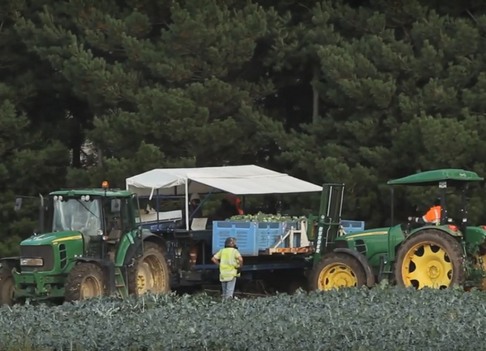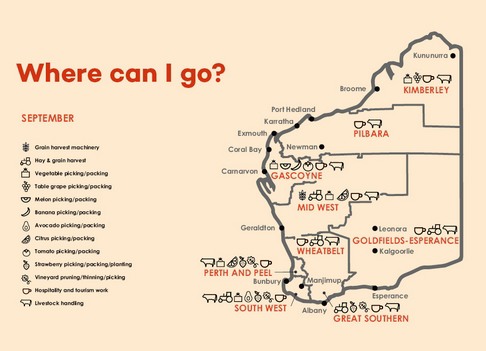Tasmanians are responding in droves to the recent agricultural jobs campaign, according to the State Government, which is encouraging the residents to roll the sleeves up and help vital primary industries.
Minister for Primary Industries and Water Guy Barnett says this is a great opportunity for Tasmanians looking for work, with a campaign launched last weekend to attract pickers, drivers, sorters, packers and pruners, which are required to complete various harvests in coming months. Around 3500 jobs are advertised on the Harvest Trail, with the Tasmanian Harvest Jobs website attracting 12,500 hits since the webpage went live.
"Our absolute top priority is to get as many Tasmanians as possible to fill these positions, with early results great news for both Tasmanians in need of work and our primary producers," Mr Barnett said. "While this is positive news, we do understand the concerns of industry and we are also actively working with them ahead of the upcoming planting, production and harvest seasons to ensure appropriate resources are in place for a successful harvest. We will continue working closely with industry to ensure they have the workforce they need to harvest produce, which feeds our state and nation."

Photo: Tasmanian Government's Department of Primary Industries, Parks, Water and Environment Agribusiness case study videos
He added the Tasmanian Government’s $1.9 million Agricultural Workforce Resilience Package also includes a two-year boost to the Safe Farming Tasmania Program to support businesses to ensure agricultural employees are workforce-ready and workplaces are COVID-19 safe.
WorkSafe Tasmania is also recruiting an additional Safe Farming Adviser and working with the Safe Farming Tasmania reference group on plans to support the industry and workers with a COVID safe harvest season. The Package also includes support for industry resilience, promotion and targeted development of skills and training with funding of $1 million over two years in partnership with peak industry groups.
Meanwhile, the Western Australian government is investing $3 million to help attract its residents to seasonal agricultural jobs across the regions.
The Primary Industries Workers Regional Travel and Accommodation Support Scheme will assist agriculture, fisheries and food processing businesses in regional areas experiencing labour shortages as a result of the COVID-19 pandemic. Under the scheme, eligible workers who move to the regions will be able to claim up to $40 a night in accommodation rebates for up to 12 weeks - up to a maximum total rebate of $3,360.
"The agriculture, food and fisheries sectors play a vital role in our State's economy, food security and regional communities," Premier Mark McGowan said. "COVID-19 travel restrictions have seen backpacker numbers in WA drop to less than half the usual number, leading to labour challenges across a range of occupations but also creating a unique opportunity for young people in WA. We are calling on young West Aussies to take this opportunity to get the 'backpacker holiday experience' at home - broadening horizons, getting to know your regions and all they have to offer."

Photo: Map showing Western Australia's 'Work and Wander out Yonder' campaign opportunities (source: Twitter)
A travel allowance will also be made available to those relocating more than 100 kilometres from their usual place of residence. Workers will be able to claim $150 for travel to the Peel, South-West, Great Southern, Wheatbelt, Mid-West or Goldfields-Esperance regions, $350 for travel to the Gascoyne or Pilbara, and $500 for travel to the Kimberley for agricultural work.
Regional Development, and Agriculture and Food Minister Alannah MacTiernan says the Western Australian Government is also continuing to advocate for the Commonwealth to do more to support the sector and incentivise the uptake of horticulture and agriculture opportunities.
"In a typical year, an additional 7,000 seasonal jobs are required over spring and summer in agriculture alone for harvesting, packing and processing work," she said. "We know it is a challenge to attract local people to these roles, so we are providing a financial incentive for a new cohort who will want to give it a try - and potentially have the adventure of a lifetime. It would be great if the Federal Government could come on board and offer some flexibility around JobSeeker or other incentives for local workers."
Regional Victoria primed to lead state's economic revival: VFF
The Victorian Farmers Federation (VFF) says regional Victoria is ideally positioned to help lead the state out of the current economic woes and is asking for both the State and Federal Governments to enable the thinking and policy needed to support growth.
VFF President David Jochinke said despite the challenges agriculture and the regions continue to face, regional Victoria has the opportunity to lead the state’s economic recovery as COVID-19 restrictions ease.
“Of course our health must always remain our top priority and we need to ensure we continue practising COVID-safe measures, but we also need to look forward to the future,” Mr Jochinke said. “COVID-19 has shown the resilience of regional Victoria. The upside of getting the regions up and running initially is enormous, not just for agriculture, but for Victoria as a whole. The longer we wait to do this, the longer the road we have to economic recovery.”
The VFF is calling for a change in government thinking and policy to enable the regions to be a vehicle for economic growth and genuine investment in critical infrastructure.
“Regional Victoria is in a much more advanced stage of COVID recovery than Melbourne. Now is the opportunity for governments to invest in the regions to help power Victoria’s economic recovery,” Mr Jochinke said. “There’s an undeniable city and country divide in infrastructure and services such as roads, rail, telecommunications, health and education. “If can we can get a commitment from the government to deliver a standard for all Victorians, the liveability of the regions will attract community and economic growth. Our message to the Victorian and Federal governments is the regions can’t wait for Melbourne to catch up. The time to entice growth in the regions and help us recover is now.”
Article Sources: Tasmania and Western Australian Government, and VFF press releases
